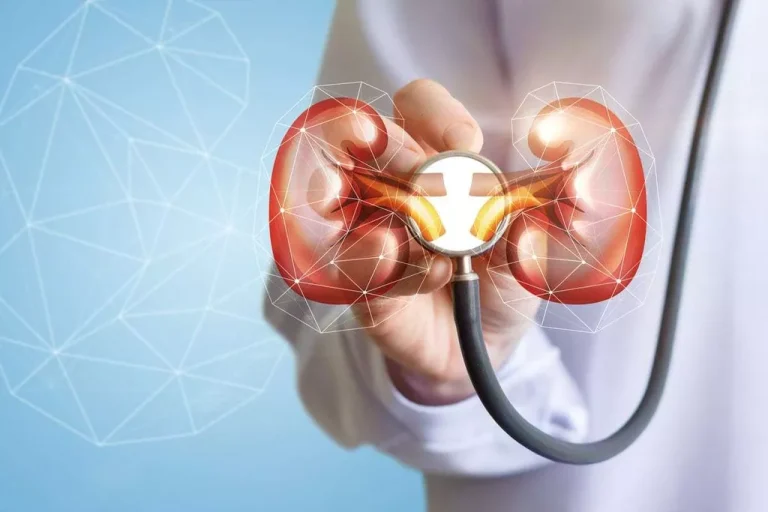Alcohol and Kidneys: Save your organism

Addiction to alcohol causes severe health issues, incapacity, and unexpected death due to different consequences. It is because ethanol breakdown products’ harmful effects travel quickly through the circulation. Without exception, the body’s many systems experience pain. Moreover, numerous people experience severe kidney pain after drinking. Let’s discover the link between alcohol and kidneys and features of effect.
Beer and other alcoholic drink enthusiasts often come up with different justifications to support addiction in their own eyes. The idea that drinking beer helps treat problems of the kidneys and urinary system is unquestionably one of the nonsensical justifications. Contrary to popular belief, consuming beer and other alcoholic beverages significantly overload the kidneys, promoting illnesses’ onset and causing alcohol and kidneys problems. Alcohol negatively affects the excretory and filtration function of the kidneys, as the breakdown products of alcohol destroy the kidney cells.
The effect of alcohol on the kidneys
Alcohol, specifically ethanol, and its metabolic by-products directly damage the kidneys. Hemodynamic abnormalities (circulation), acid-base balance, hormonal imbalance, and water-electrolyte changes are also part of the kidneys and alcohol abuse harmful mechanisms.
Alcohol can disturb urodynamics and provoke autoimmune processes in the kidneys and the evolution of chronic inflammatory illnesses. All these variables contribute to a variety of alcohol and kidneys diseases. The development of the following alterations in the urinary system is triggered by alcohol:
- Inflammatory processes in the renal pelvis and bladder.
- Pathological changes in the adrenal glands.
- The formation of kidney stones.
- The development of malignant neoplasms.
- Impaired kidney function leads to the intoxication of the body.
- Intoxication of kidney tissue.
Body fluids accumulate due to metabolic failure. The result is puffiness and circles beneath the eyes in a drinker. Persistent intoxication, or self-poisoning by those dangerous compounds that are no longer expelled, which results from drinking alcohol, causes alcohol and kidneys and back pain. Thus, there is increased tiredness, lethargy, sleepiness, and general ill health.

Take back control of your life and start on the road to recovery now.
A safe amount of alcohol
If you consume no more than 0.1 liters of vodka or a small amount of beer every day and then abstain from alcohol for a week, alcoholic beverages will not hurt your kidneys.
The hazardous threshold for alcohol and kidneys is 170 grams of pure alcohol for 24 hours. The body heals, and the kidneys won’t be harmed if you don’t exceed the recommended daily intake and stay sober. The kidneys suffer if you consume more than 170 grams of pure alcohol at once, but they recover. If you consistently consume more alcohol than is recommended, your kidneys might damage.

Clinical signs
A person who has consumed an excessive amount of alcohol displays clear signs of alcohol and kidneys problems, including:
- intense thirst;
- puffiness under the eyes;
- decreased blood pressure;
- an accelerated heartbeat;
- a change in the color of the urine;
- lower back pain syndrome;
- painful eye reactions to light.
The primary symptom is the bladder’s failure to empty itself despite being overfilled. Even in the absence of stones, acute urine retention might happen. The central nervous system’s depressed functioning, stimulation of the prostate and urethra, and reflex bladder sphincter violation are the causes of this disorder.
Treatment of kidney diseases
A trip to the doctor should be put on time since only prompt examination and diagnosis of renal problems enables you to provide effective treatment and prevent irreparable alterations. Since kidney tissues actively regenerate, immediate medicine examination and dietary changes provide a favorable prognosis.
It should be kept in mind, drinking alcohol and renal illness are incompatible conditions. Even without adequate therapy, total abstinence from alcohol may occasionally dramatically lessen the severity of symptoms. It is advised to speak with a narcologist and select the optimal alcoholism treatment strategy, considering the available indications and contraindications, if self-refusal of alcohol presents difficulties. The effectiveness of the kidneys’ continued therapy rises, as seen by experience.

This can be a difficult journey, but you don’t have to go it alone. Let us be your guide and provide you the environment needed to regain control of your life and begin the path to recovery.
Eco Sober Houses can help
Everyone battling alcoholism who has kidney disease or just wants to prevent it may get help from Eco Sober Houses. It blends a sober neighborhood with aftercare, assisting clients in developing new abilities to approach life’s issues in an innovative and motivating way. Clients receive support from the sobriety center to achieve long-term recovery, overcome shame, and discover how to lead satisfying lives. The Sober House fosters the development of a new, positive, and upbeat sober lifestyle while encouraging honesty and integrity.
The staff’s direction and support go above and beyond to guarantee each client’s success. At Eco Sober Houses, the combination of comprehensive support, career guidance, and fostering job security is instrumental in the overall healing process. Many individuals find the road to recovery challenging; for assistance, call to Sober House helpline. You will get anonymous counsel from kind professionals who will assist you in taking the first step toward recovery.




